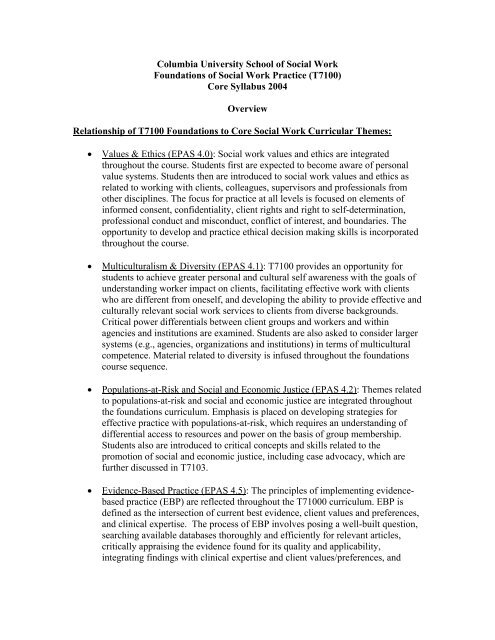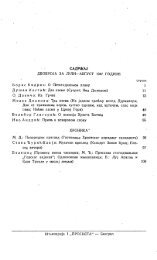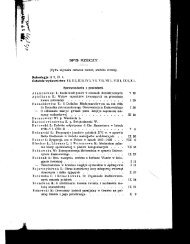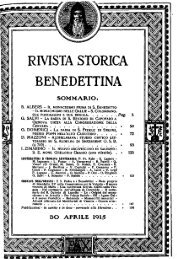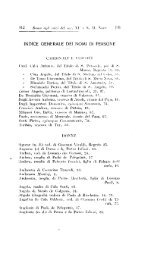T7100 - Columbia University
T7100 - Columbia University
T7100 - Columbia University
- No tags were found...
You also want an ePaper? Increase the reach of your titles
YUMPU automatically turns print PDFs into web optimized ePapers that Google loves.
assessing the results of action taken (Sackett, et al., 1997; 2000; Gibbs, 2003).Relationship of <strong>T7100</strong> Foundations to Field Education (EPAS 4.5, 4.7):Because the first year field placement is focused on generalist practice, students areplaced across all levels of practice. <strong>T7100</strong> provides students with their initial orientationto field work in the beginning of the course. Further, the acquisition of skills through thefield placement is complemented by the opportunity for skill development in <strong>T7100</strong>. Theprimary focus of skill development in this course is on beginning skills includingoutreach, engagement, contracting, assessment, termination and evaluation. In addition toevaluation of client outcomes, students are expected to develop an ability to criticallyevaluate professional use of self and self monitoring in social work practice. Specificskills for intervention with individuals, families and small groups are addressed in greaterdepth in 7102; social advocacy and macro practice skills are further developed in 7103.Relationship of <strong>T7100</strong> Foundations to T7102 and T7103:Concepts involved in the <strong>T7100</strong> course are amplified in subsequent foundation andadvanced curricula through courses possessing their own integrity and special emphases.The primary emphasis of <strong>T7100</strong> is to provide an overview of essential introductoryconcepts and skills for social work practice at all levels (individuals, families, groups,organizations and communities). In the second semester of the first year, students deepentheir learning in both micro and macro practice. The focus of T7102 is micro practice andis concerned with direct practice with individuals, families and small groups. Thecompanion course, T7103, focuses on macro practice with organizations andcommunities, and on social work advocacy.Course ObjectivesStudents should acquire:1. Understanding of professional purpose and specific social work values and theirethical implications. Achieving this objective requires an awareness of personalvalues, as well as of core social work values including regard for individual worthand dignity, self-determination, respect for the unique characteristics of diversepopulations, and the importance of ensuring that social institutions are humane andresponsive to human needs.2. Beginning knowledge of the multiple frames of reference that reflect the organizationand diversity of the profession. This refers to familiarity with various models,methods, practice roles, and fields of practice, including exposure to new advances inpractice knowledge.3. Initial ability to apply critical thinking skills to practice, including the selection andapplication of appropriate theories and knowledge to particular situations.4. Initial skill in application of the knowledge and skills of generalist practice in workwith systems of all sizes with special attention to populations-at-risk. This includesskills to enhance the well-being of people and to help ameliorate the environmentalconditions that affect people adversely.<strong>T7100</strong> Core Syllabus 20042
5. Appreciation of the role of research for evaluating programs and service delivery inall areas of practice. This includes understanding the rationale for practicemonitoring, as well as developing beginning skills in the systemic empiricalevaluation of practice, including specifying goals and objectives and how to carry outa simple monitoring plan.6. Initial skill in the differential use of communication skills with a variety of clientpopulations, colleagues, and members of the community, and recognition of thecritical importance of mutuality, collaboration and respect for the client system.Themes for First Year Foundations (Proseminar & 7100)PROSEMINAR THEMES** (to be included in 7100 AY 2004-2005)The Professiona. Purpose and Domainb. Ethics and Valuesc. Historyd. Professional socializationSocialization to the professionSocialization to CUSSWe. Integration with Field EducationFields of practiceCOURSE THEMES FOR 7100People in their Diversity within an Environmental ContextA. Cultural diversityB. Cultural competenceC. Environments: Physical Environments, Institutional Environments (e.g. schools,workplace, health systems, etc.), Community as Environment, and Agency asEnvironmentD. Institutionalized Oppression and Discrimination as Critical Elements of theEnvironmental ContextSocial & Justice & Social ActionA. Case AdvocacySources of Knowledge/Evidence-Based PracticeA. Social and Behavioral Sciences, Quantitative and Qualitative Research, PracticeB. Wisdom and the Liberal Arts PerspectiveC. Critical thinkingD. Self-awarenessPhases of Work: Overview of Helping ProcessA. Emphasis on Beginnings:Engagement & AssessmentProblem-FormulationContractingB. Middles<strong>T7100</strong> Core Syllabus 20043
C. Endings & TerminationMethods, Models and PerspectivesA. Generalist PracticeB. EcosystemsC. Strengths PerspectiveD. Problem-Solving ApproachesE. Crisis InterventionF. Case ManagementOverview of Selected TheoriesMicro, Mezzo, and Macro PracticeUnits of AttentionA. IndividualsB. FamiliesC. GroupsD. OrganizationsE. CommunitiesMonitoring and EvaluationA. Measurement of ProgressB. Measurement of OutcomesSkill Development (Lab Component)A. Interviewing SkillsB. Differential use of communication skills across populations and settings<strong>T7100</strong> Skill Development Lab: Core SkillsPre-EngagementAnticipatory empathyEngagementActive listeningAttending behaviorEmpathyAssessmentQuestioning/ProbingOpen-ended questionsClosed-ended questionsClarificationReflecting feelings and contentUsing assessment toolsEcomaps, genogramsProblem identificationSharing your view of the problemContractingWorking with voluntary vs. involuntary (socially and legally mandated) clientsWorking with clients different from oneselfRace, ethnicity, disability status, religion, genderGroup skillsForming a group<strong>T7100</strong> Core Syllabus 20044
Group facilitationFamily assessment skillsOrganizational assessmentCommunity assessmentDiagnosing a neighborhoodSpecialized assessment skillsSuicide assessmentCrisis interventionCase managementCase advocacyTermination<strong>T7100</strong> Core Syllabus 20045
Course OutlineWeek 1: Sources of KnowledgeIntroductions/Orientation to FieldWeek 2: History, Philosophy & Purpose of Social Work; Social Justice (To beincluded in Proseminar 2005)Lab: Preparing for Clients, Basic Communication Skills, Building RapportAnticipatory Empathy; Physical Space Exercise, Stereotypes ExerciseVideo: Legacies of Change, Regarding Ourselves, The Women of Hull HouseWeek 3: Ethics & Values (To be included in Proseminar 2005)Lab: Ethics and Values in Practice; Ethical Decision-MakingVideo: Professional Choices: Ethics at WorkWeek 4: Systems of SupportThe Helping RelationshipHelp-seeking & Help-receivingVoluntary & Involuntary ClientsLab: EmpathyRelationship Building and EngagementWeek 5: Overview of Phases of Work: Beginnings, Middles, & Endings/TerminationFocus on Beginnings: Assessment I: Ecosystems PerspectiveAgency & Community Contexts for PracticeLab: Assessing client systemsEcomapsWeek 6: Phases of Work IIAssessment II: Problem DefinitionGeneralist Practice, Strengths PerspectiveLab: Formulating Goals, Objectives & ContractsConducting a mental status examDSM-based assessmentVideo: DSM-IV interview from diagnosis videotape series (204-206)Week 7: Phases of Work IIIAssessment III: Specifying Goals and ObjectivesLab: Working with Clients Different from oneselfWeek 8: Methods, Models, & Perspectives for Assessment & Intervention I:Cognitive-Behavioral Approaches, Case Management, Crisis Intervention,Problem-Solving, Task-Centered, and Solution Focused InterventionLab: Crisis-InterventionDebriefing SkillsVideo: I’d hear laughter (Solution-focused interviewing)<strong>T7100</strong> Core Syllabus 20046
Week 9: Methods, Models, & Perspectives for Assessment & Intervention II:Psychodynamic ApproachesLab: Assessment of substance abuseWeek 10: Methods, Models & Perspectives for Assessment & Intervention IIIEmpowerment ApproachesLab: Violence AssessmentVideo: Suicide Risk AssessmentWeek 11: Units of Attention I: Individuals, Children and FamiliesLab: Assessment of Family Systems; Family SculptureVideo: From a Secret Place (adolescent youth discuss coming out, sexualidentity/orientation)Week 12: Units of Attention II: GroupsLab: Forming your own groupVideo: Group psychotherapy with YalomWeek 13: Units of Attention III: Macro Practice in CommunitiesLab: Diagnosing a neighborhood -- Community Walk (Dress for 30-40 minute walk in aneighborhood near <strong>Columbia</strong>)Week 14: Units of Attention IV: Macro Practice in OrganizationsCase Studies to be developed by Social Administration facultyWeek 15Termination/EndingsWeek 16Evaluating & Monitoring PracticeCourse EvaluationsLab: Evaluating practice outcomes<strong>T7100</strong> Core Syllabus 20047
SAMPLE WRITTEN ASSIGNMENTS1. Genogram/Reflection Paper (adapted from Cournoyer, 1996)2. Agency & Community Context Paper3. Diversity Chapter4. Practice Integration Paper5. Reading Log6. Foundations of Social Work Practice: Journal Assignment Series7. Posing an Answerable Question8. Research Summaries using Gibbs’ (2003) procedures9. Practice Paper10. Interdisciplinary Reflection Paper<strong>T7100</strong> Core Syllabus 20048


